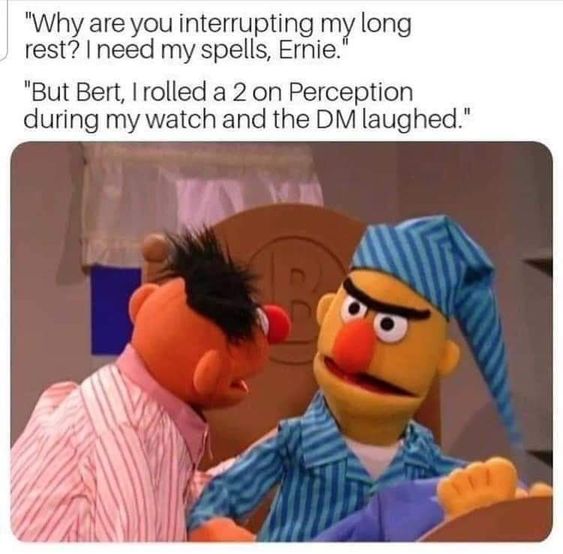this post was submitted on 28 Mar 2024
539 points (98.4% liked)
RPGMemes
10500 readers
151 users here now
Humor, jokes, memes about TTRPGs
founded 2 years ago
MODERATORS
you are viewing a single comment's thread
view the rest of the comments
view the rest of the comments

As a GM, you should have a sheet with the stats for your PCs that determine these kinds of rolls. If the PC wouldn't know if they succeed or fail, then the player shouldn't know the result of the roll, or sometimes even what the roll is for in the first place.
It's hard to avoid metagaming when you very clearly failed a roll and the GM says "Everything seems fine and normal to you"
That's why you call rolls for no reason, though.
Or trust your players to metagame in the opposite direction, making terrible decisions.
When the low rolling character convinces the high rolling one, that they are seeing things, the real fun begins.
That is one alternative, yes. Needlessly tedious in my opinion, but that's just my personal taste.
Doesn't need to be often. Just enough to make them more (or less?) paranoid.
That's just meta-meta-gaming imo. Fine if that's your group dynamic, just not my thing. Personally, it seems like way more time and effort.
We, as human beings, often register false positives or harbor paranoias - noises where there are none, still shadows turned to sweeping figures. Rolls without reason simply simulate that within the context of tabletop roleplaying.
I would actually pair that with secret rolls. Every once in a while, just roll the dice behind the screen, consider the result sagely, then make no mention of it and continue as usual.
I mostly disagree. It takes away a feeling of agency even if its still random at the end of the day. Just trust your players not to meta game. There are exceptions when it would be hard for the player to still get the intended experience when not meta gaming; but leaving the existence of that experience up to a roll in the first place is probably whats at fault.
Perception stats exist for a reason, and I'd argue they're usually incompatible with knowing the result of the roll, even with players who try not to meta-game. Even if they behave, they're subconsciously going to know how they rolled and that will change the experience, unless you start meta-meta-gaming (changing the success window, frequently calling for rolls for nothing, etc.). Personally that seems like a pound of cure vs an ounce of prevention.
If a semi-spoiler-laden, actively counter-meta-gamed experience is what your group likes, more power to you. But more often than not, I think the GM rolling for checks where success/failure isn't obvious preserves the experience for all players and prevents meta-gaming, both intentional and subconscious.
My experience is that, in practice, players actually like secret checks more often than they don't. The feel-bad of "player agency" loss (what agency is there in rolling a die? It's literally an agency destroying mechanic) occurs at the conceptual level, long before ever experiencing it at the table. Telling a player that just hid that they don't think the guards can see them really heightens the immersion, and players tend (most of them, most of the time, on average) to get into that.
You can't have tension when the player knows they rolled a 19 on the die.
Yeah, I love rolling dice, but certain rolls shouldn't be done by the players.
Rolling on a hit in combat? That should definitely be the player. You know how well you swing your sword and when it makes good contact.
Rolling on perception should almost always be done by the DM. This is especially true when another party member can rescue the bad roll. Like, someone rolls to spot a hidden enemy. They fail, but shouldn't know it, but they rolled a 2, so... Another player at the table sees this horrible roll and they have their character light a torch and look out into the wilderness. Sure, that's metagaming, but it's really hard to avoid when you know someone failed a potentially important roll.
One idea I'd like to see, and might try if I ever DM'd a game would be Dunning-Kruger rolls. The Dunning-Kruger effect is basically how people who are incompetent at something sometimes think they're much better than they are, and people who are experts (and realize how complex things are) underestimate their own competence.
So, in this case, the DM rolls a die which says whether the rolls are normal or reversed, then the player rolls. If the DM's roll said the player's roll was reversed, the player's 20 might become a 1, or a 1 might become a 20 (the actual number is 21 - roll). Mid rolls stay roughly the same: a 10 becomes an 11, for example.
If the barbarian is trying to check for traps and gets an 18, the DM might say "You're confident there are no traps", but that could be the result of overconfidence when they really "rolled" a 3. If they get a 10, the DM might say "You didn't notice a trap, but you're not sure". You could set this up so if someone has a proficiency, the DM rolls a D10 and only a 1 means the player's role is reversed. But, if the player is trying something they're not good at, a 1 to 5 on the D10 means it's reversed.
I haven't tried this, so there may be serious flaws in it in reality. But, I like the idea of players still being able to roll for something like spotting a hidden enemy, but not knowing for sure if their roll is good or not.
This is why you tell them sometimes the good result on a low roll.
Didn't old school D&D have the DM roll on the player's behalf?